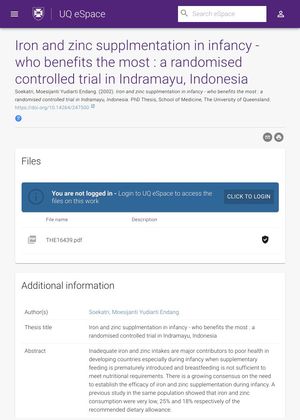Iron and Zinc Supplementation in Infancy: Who Benefits the Most? A Randomized Controlled Trial in Indramayu, Indonesia
April 2024

TLDR Iron supplements improved hemoglobin levels and combined iron and zinc reduced measles risk in Indonesian infants.
The study, a randomized controlled trial conducted in Indramayu, Indonesia, investigated the effects of iron and zinc supplementation on infant growth and morbidity. The study involved 800 healthy infants aged 5-7 months, with a nested study of 199 infants. The infants were randomly assigned to receive either zinc (10 mg/day), iron (10 mg/day), both, or a placebo for 6 months. The results showed that iron supplementation had a significant positive effect on hemoglobin levels, but no significant effect on morbidity. Zinc supplementation had a significant preventive effect on persistent diarrhea, but was associated with a greater risk of measles and a higher occurrence of runny nose. The interaction of iron and zinc supplementation resulted in a net reduction in measles risk. The study also found that dietary intake influenced the effects of the supplements on growth and morbidity. The study concluded that iron had a beneficial effect on improving hemoglobin levels, and the interaction of iron and zinc had a protective effect against measles. Zinc supplementation had a complex interaction with diet that needs further investigation.



